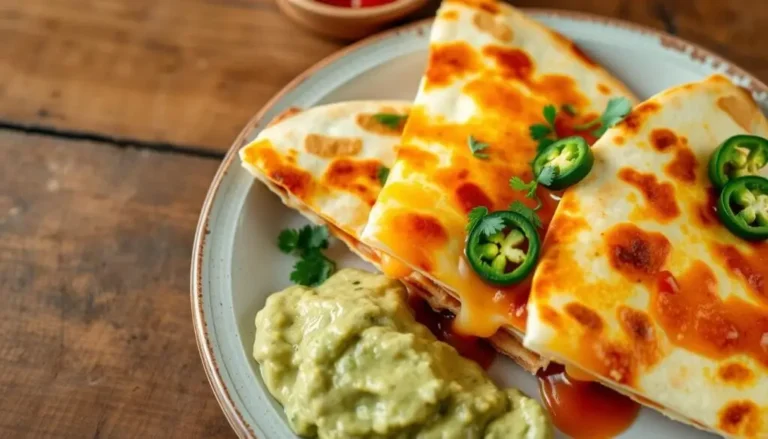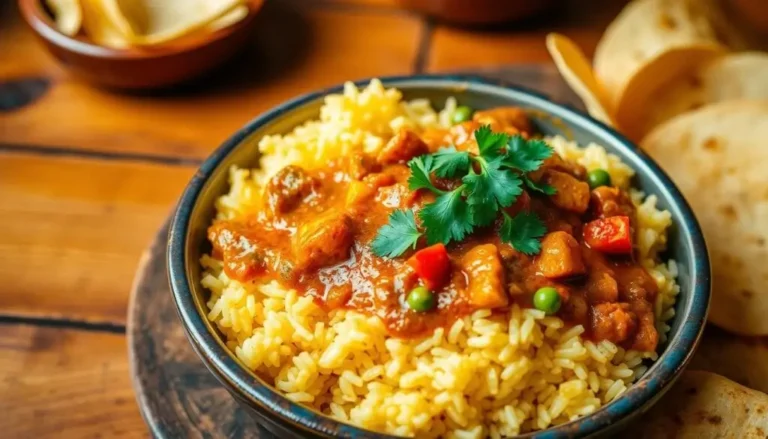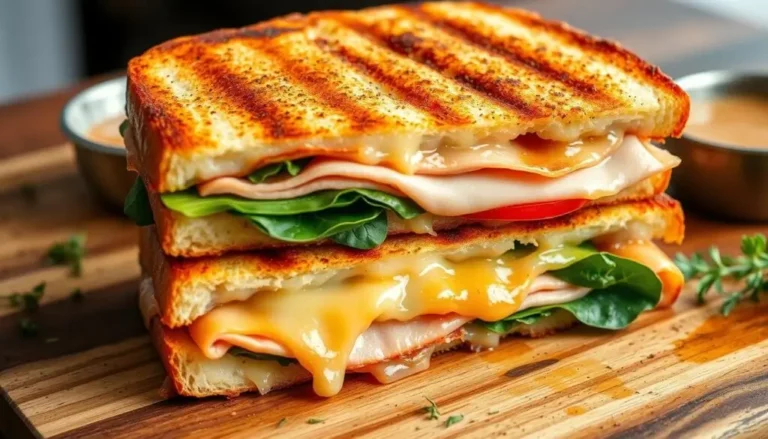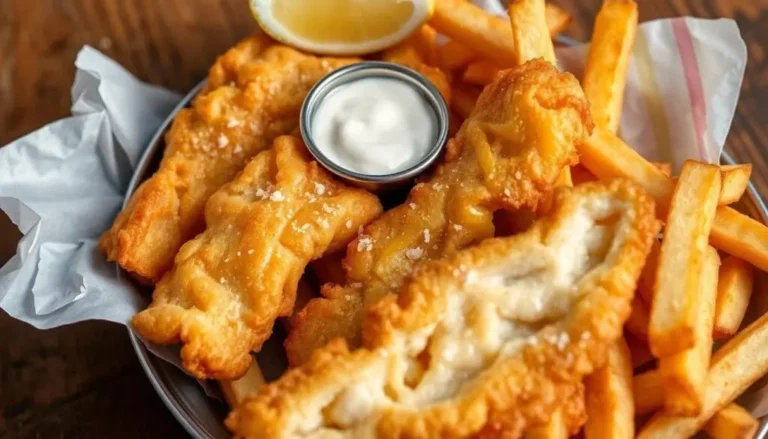Delmonico Steak: The Ultimate Recipe for Tender, Flavorful Perfection
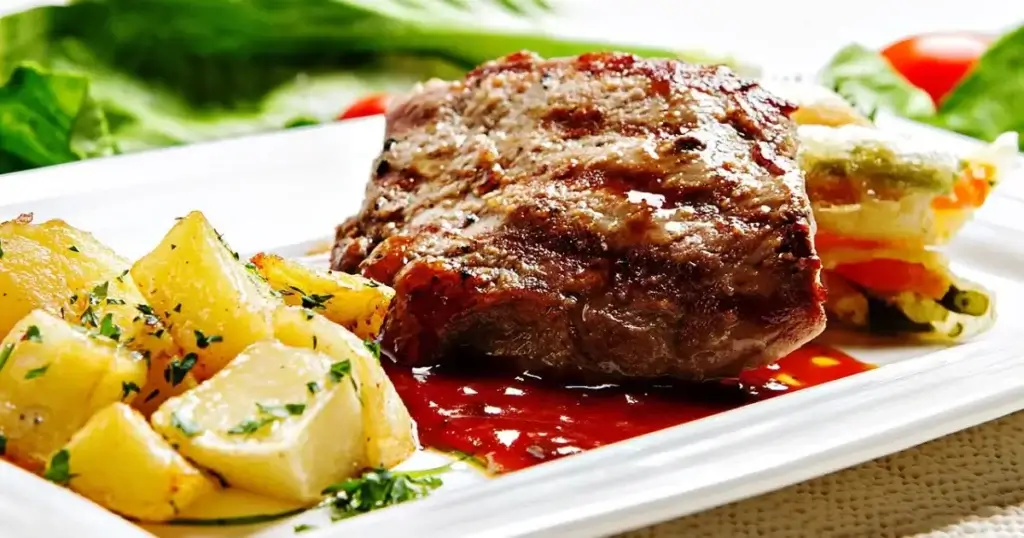
The first time I had a perfectly cooked Delmonico steak, it was magical. It turned a simple dinner into a memorable experience. This cut of meat is a true American steakhouse classic.
Delmonico steak is more than just beef. It’s a piece of history from New York City’s famous Delmonico’s restaurant. Whether you’re a pro chef or a home cook, learning to make this steak will boost your skills. It will also wow anyone who tries it.
This steak is known for its rich flavor and tender texture. It’s a journey of taste and cooking techniques. Get ready to learn how to make a prime rib experience at home, just like the best steakhouses in the U.S.
Table of Contents
The Rich History of Delmonico’s Restaurant Legacy
Delmonico’s is the top choice for a classic New York steakhouse. It started in 1827 as a small pastry shop by Swiss brothers. This place became a game-changer in American fine dining.
The story of Delmonico’s began in downtown Manhattan. It grew from a simple shop to a leading restaurant. By 1831, the Delmonico brothers introduced America’s first real restaurant, changing dining forever.
Origins in 1837 New York City
Delmonico’s was a trailblazer in American dining. Their 1838 menu showed a wide range of beef dishes. These included:
- Boiled beef
- Beef steak
- Tenderloin
- Beef tongue
Evolution of Fine Dining Standards
The restaurant’s focus on quality was clear. In 1859, meals cost between $5 and $50. That’s like $188 to $1,881 today. Delmonico’s also supported the farm-to-table movement, owning a 220-acre farm in Brooklyn.
| Year | Culinary Achievement |
|---|---|
| 1867 | Created Baked Alaska |
| 1876 | Invented Lobster Newberg |
| 1859 | First New York Times restaurant review |
Impact on American Steakhouse Culture
Delmonico’s became a national icon. Its innovative dining set new standards across the U.S. Today, it still inspires top restaurants, marking a significant moment in American culinary history.
“Delmonico’s isn’t just a restaurant; it’s a culinary institution that redefined American dining.” – Culinary Historian
Understanding the Delmonico Steak Cut
The Delmonico steak is a special cut of beef. It comes from the chuck eye and loin areas. This makes it different from regular ribeye and chuck eye steaks.
This steak has a long history in New York City’s dining scene. Chefs and butchers have always debated what makes it special. But, it’s known for its size, thickness, marbling, and flavor.
- Typically weighs nearly one pound
- Measures approximately 2 inches thick
- Features extensive marbling throughout the cut
- Delivers an intensely rich flavor profile
The Delmonico steak is more than just a cut of meat. It’s a tradition in cooking. Restaurants used to serve their best steak and call it “Delmonico”. This made it seem even more special.
“The Delmonico steak represents the pinnacle of beef excellence, embodying both tradition and exceptional taste.” – Culinary Experts
When comparing the Delmonico to other cuts like ribeye, several key differences emerge:
| Characteristic | Delmonico Steak | Ribeye |
|---|---|---|
| Average Weight | Nearly 1 pound | About 1/2 pound |
| Thickness | 2 inches | 1-1.5 inches |
| Marbling | Extensive, even distribution | Moderate |
Whether you’re a chef or just love cooking at home, knowing about the Delmonico steak can improve your skills. It shows you appreciate the best in beef.
Characteristics of Premium Beef Selection
Choosing the perfect Delmonico steak is all about quality. You need to know what makes a cut stand out. This knowledge will lead to a memorable meal.
Marbling Quality and Grade
Beef marbling is key to a great steak. The white fat streaks add flavor and tenderness. Here’s what to look for in a steak:
- Fine, evenly distributed white fat streaks
- Consistent marbling patterns throughout the cut
- Rich, creamy white fat that promises juiciness
“Great steak begins with exceptional marbling – it’s the difference between good and unforgettable.” – Culinary Expert
Ideal Thickness and Size
A premium Delmonico steak is big and bold. It weighs almost a pound and is 2 inches thick. This size ensures:
- Consistent internal cooking
- Optimal flavor retention
- Perfect texture development
Color and Texture Indicators
When picking premium beef, look and feel are important. A top-quality Delmonico steak should have:
- Color: A vibrant, deep red indicating freshness
- Texture: Firm yet tender to the touch
- Surface: Smooth with minimal moisture
Knowing these traits helps you choose a Delmonico steak that’s truly exceptional. It showcases the best of beef quality and culinary skill.
Essential Kitchen Tools and Equipment
Preparing the perfect Delmonico steak needs more than just great meat. Your grilling tools play a big role. A good steak setup includes several key items that make a meal special.
Meat thermometers are all about precision. Digital instant-read thermometers like the Thermapen ONE give quick and accurate readings. This ensures your steak is cooked just right every time.
Essential Grilling Tools Checklist
- Digital meat thermometer
- Long-handled tongs
- Heavy-duty cutting board
- Sharp chef’s knife
- Cast iron skillet or grill
- Aluminum foil for resting
Quality steak knives can really improve your meal. Not all knives are the same. The sharpness of the blade and how comfortable the handle are key.
| Knife Set | Weight (grams) | Price Range |
|---|---|---|
| Victorinox Grand Maître | 92.5 | $347-$386 |
| Made In Steak Knives | 101.25 | $349-$398 |
| Amazon Basics Set | 81.25 | $50 |
Pro tip: Always choose straight-edged knives for clean slicing and avoid serrated edges that can shred your perfectly cooked steak.
Remember, investing in good grilling tools is worth it. A reliable meat thermometer ($20-$30) and quality utensils can take your steak prep from good to great.
Perfect Marinade and Seasoning Combinations
To make your Delmonico steak truly special, learn about marinades and seasonings. The right mix of flavors can turn a top-notch cut into a work of art.
Classic Herb and Garlic Marinade
A great marinade can enhance your Delmonico steak’s taste. Here’s a strong marinade recipe:
- Extra virgin olive oil
- Red wine vinegar
- Honey
- Worcestershire sauce
- Fresh thyme
- Minced garlic
- Kosher salt and black pepper
Dry Rub Options
For a dry rub, try this mix:
| Ingredient | Quantity |
|---|---|
| Coarse salt | 2 tablespoons |
| Black pepper | 1 tablespoon |
| Garlic powder | 1 teaspoon |
| Smoked paprika | 1 teaspoon |
Timing and Technique
For a tender, tasty Delmonico steak, follow these tips:
- Marinate thicker cuts for 6-8 hours
- Massage marinade or dry rub into the meat well
- Let the steak come to room temperature before cooking
Pro tip: Always pat your steak dry before seasoning. This helps get a great sear and better flavor.
Try out these marinades and dry rubs to find your favorite. The right seasoning can make your Delmonico steak unforgettable.
Mastering the Two-Zone Grilling Method
Learn the secret to grilling Delmonico steak perfectly with the two-zone method. This technique turns your grill into a precise cooking tool. It lets you control heat and doneness exactly.
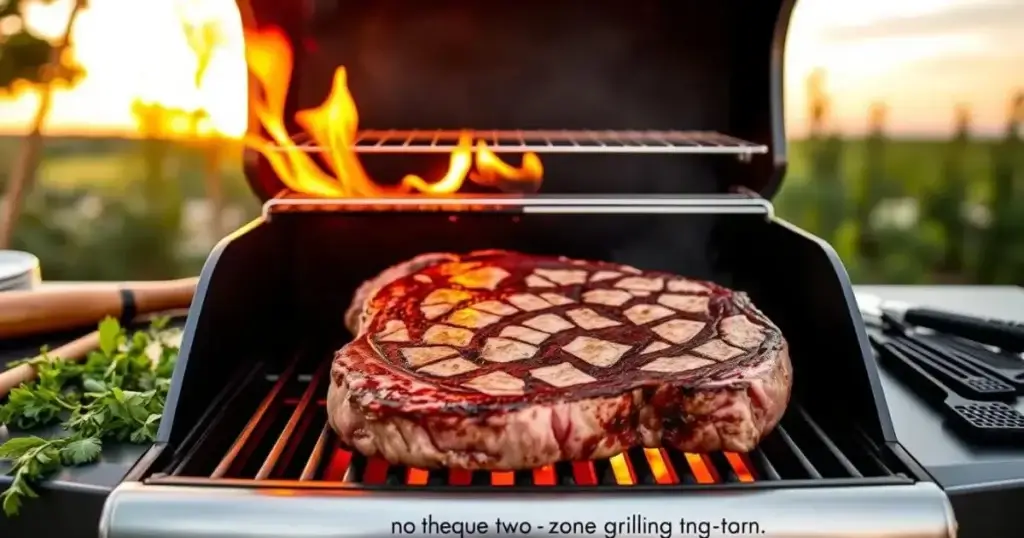
The two-zone method sets up your grill with two heat zones. This lets you cook with precise temperature control. Here’s how to set it up:
- Divide your grill into a high-heat searing zone and a lower-temperature cooking zone
- Preheat one side to 450-500°F for intense searing
- Keep the other side at a lower temperature for gentle cooking
“Control is the key to a perfectly grilled steak” – Grilling Experts
Lazy T Ranch suggests a strategic two-zone grilling approach:
- Let the steak reach room temperature (about 30 minutes)
- Season generously with salt and pepper
- Sear on high-heat zone for 3-5 minutes per side
- Move to cooler zone to finish cooking
Your goal is to get the perfect internal temperature and a tasty crust. Use a meat thermometer for precision.
| Doneness Level | Internal Temperature | Cooking Time |
|---|---|---|
| Rare | 125°F | 3-4 minutes per side |
| Medium Rare | 130-135°F | 4-5 minutes per side |
| Medium | 140-145°F | 5-6 minutes per side |
Let your steak rest for at least 5 minutes after grilling. This lets the juices spread, making your Delmonico steak tender and flavorful. It will impress any grill master.
Temperature Guide for Different Doneness Levels
Achieving the perfect steak doneness requires precision and the right tools. A reliable meat thermometer is your secret weapon for creating a restaurant-quality steak right in your own kitchen.
Understanding steak temperature is crucial for delivering exactly the taste and texture you desire. Different levels of doneness bring unique flavor profiles and eating experiences.
Using Meat Thermometers Effectively
When checking steak temperature, follow these key guidelines:
- Insert the meat thermometer into the thickest part of the steak
- Avoid touching bone or fat for accurate readings
- Clean your thermometer between uses to prevent cross-contamination
Precise Doneness Temperature Ranges
| Doneness Level | Temperature Range | Estimated Cook Time |
|---|---|---|
| Rare (Red) | 125°F-130°F | 8 minutes |
| Medium Rare (Pink) | 130°F-135°F | 9 minutes |
| Medium (Light Pink) | 135°F-140°F | 10 minutes |
| Medium-Well | 140°F-150°F | 11 minutes |
| Well-Done | 155°F or above | 12 minutes or more |
Resting Times and Final Temperature
After cooking, let your steak rest for 5-10 minutes. This crucial step allows juices to redistribute, ensuring a more tender and flavorful eating experience. During this time, the internal steak temperature can rise an additional 5-10 degrees.
“Patience is the secret ingredient in perfect steak preparation.” – Professional Chef
Remember, the FDA recommends cooking steak to a minimum of 145°F for medium-well doneness to ensure food safety. Pregnant individuals should especially adhere to this guideline to reduce exposure to harmful bacteria.
Pan-Searing and Oven-Finishing Techniques
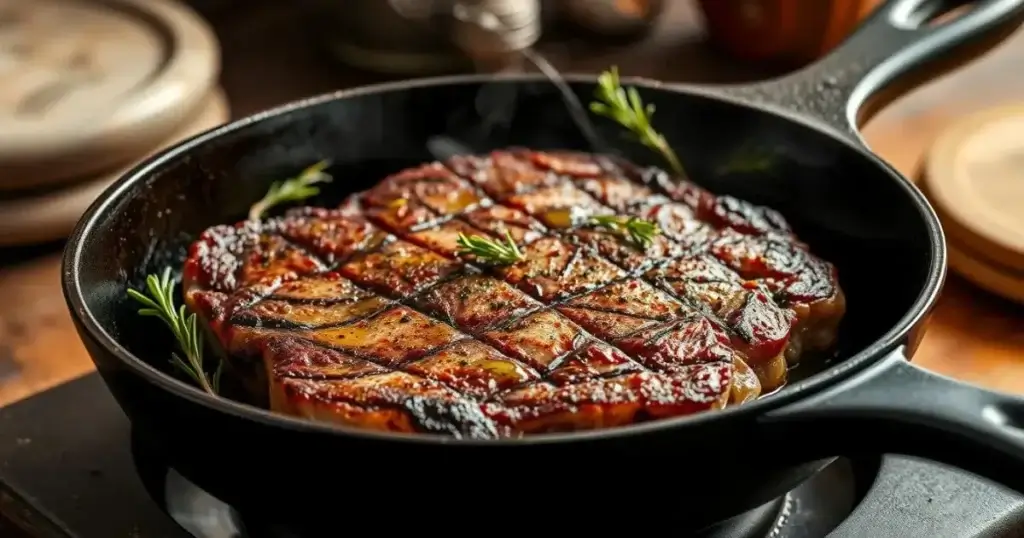
Learning how to pan-sear and oven-finish a steak can turn a simple cut into a gourmet dish. This method uses high heat to sear the steak and then finishes it in the oven. This way, you get a crispy outside and a juicy inside.
“The secret to an incredible steak lies in understanding heat management and technique.”
To pan-sear a steak well, follow these steps:
- Choose a heavy-bottomed cast-iron skillet for even heat distribution
- Pat the steak dry with paper towels to ensure proper browning
- Use high smoke-point oil like avocado or grapeseed
- Preheat the skillet until it’s scorching hot
For the oven-finished steak, start by searing each side for 2-3 minutes. This creates a rich, caramelized crust. Then, move the skillet to a preheated 375°F oven.
| Cooking Stage | Temperature | Time |
|---|---|---|
| Searing | High (500-550°F) | 2-3 minutes per side |
| Oven Finishing | 375°F | 6-10 minutes |
Pro tip: Always use a meat thermometer to check internal temperature and achieve your desired doneness.
Serving Suggestions and Wine Pairings
Make your Delmonico steak dinner special with the right sides and wine. The perfect pairings can turn a good meal into an unforgettable one.
- Creamy garlic mashed potatoes
- Roasted seasonal vegetables
- Crispy truffle parmesan fries
- Grilled asparagus with herb butter
Wine pairing can really make your meal better. Did you know 74% of sommeliers say to try different wines, not just the usual ones?
“The perfect wine doesn’t just accompany a steak – it elevates the entire culinary experience.” – Wine Expert Jack Mason
Wine Pairing Recommendations
| Steak Cut | Recommended Wines | Flavor Profile |
|---|---|---|
| Delmonico | Cabernet Sauvignon, Malbec | Bold, full-bodied |
| Ribeye | California Zinfandel | Spicy, high acidity |
| Filet Mignon | Light Pinot Noir | Delicate, smooth |
Did you know 61% of sommeliers recommend white wines like rosé Champagne or white Burgundy for steak? They’re great choices that break the mold.
Here’s a tip for serving Delmonico steak: Let it rest for 5-10 minutes after cooking. This makes it juicy and flavorful. Choose a wine that complements the steak’s richness and your taste.
Common Cooking Mistakes to Avoid
Mastering steak cooking means avoiding big mistakes. These errors can turn a great meal into a bad one. Knowing what mistakes to avoid will make your steak perfect every time.
Temperature Control Challenges
Keeping the right temperature is key. Many home cooks make mistakes that hurt the meat:
- Cooking steak straight from the fridge
- Not warming up cooking surfaces enough
- Not using a meat thermometer
Letting your steak warm up for 30-45 minutes before cooking helps. It ensures a good sear and even doneness.
Seasoning and Timing Pitfalls
Seasoning is another area where mistakes happen. The goal is to find the right balance:
- Use coarse salt and freshly cracked pepper
- Season just before cooking to keep moisture in
- Avoid too much salt to keep the meat’s flavor
Resting Period Misconceptions
The resting period is very important. After cooking, let your steak rest for 5-10 minutes. This helps juices spread and makes the meat tender.
“Patience transforms a good steak into an exceptional dining experience.”
| Mistake | Consequence | Solution |
|---|---|---|
| Cold Meat | Uneven Cooking | Room Temperature Rest |
| Overcrowded Pan | Steaming Instead of Searing | Cook in Batches |
| Incorrect Seasoning | Bland or Overpowering Taste | Balanced, Simple Seasoning |
By knowing and avoiding these mistakes, you’ll improve your grilling. You’ll make sure your steak is always delicious and perfectly cooked.
Conclusion
Your delmonico steak recipe journey shows the art of cooking is more than just following a recipe. It’s about celebrating flavors, techniques, and traditions. Learning about the history and cooking methods makes any meal special.
Choosing the right cuts and mastering temperature control are key. These skills show your culinary knowledge and respect for steakhouse traditions. Paying attention to details like searing time and resting periods is crucial for a tender steak.
Whether you’re grilling at 130°F for a perfect medium-rare or trying different cuts, remember, great steak preparation is a skill that grows with practice. Each time you cook, you’ll get better, bringing the luxury of Delmonico’s Restaurant to your kitchen. With dedication and passion, you’ll make steaks that impress and delight.
Start your journey to becoming a steak master. Your taste buds and guests will love the delicious results of your delmonico steak recipe skills.
FAQ
What exactly is a Delmonico steak?
How is a Delmonico steak different from a ribeye?
What is the best way to cook a Delmonico steak?
What internal temperature should I aim for when cooking?
What are the best marinades for a Delmonico steak?
What wines pair well with Delmonico steak?
How do I select a high-quality Delmonico steak?
Can I cook a Delmonico steak in a pan?
What are common mistakes to avoid when cooking Delmonico steak?
Have you cooked any of our recipes yet?
There are no reviews yet. Be the first one to write one.



